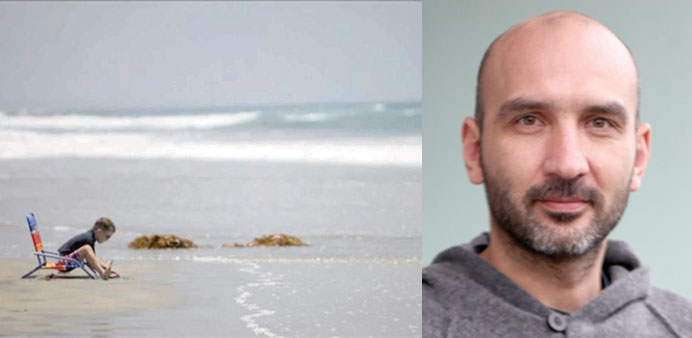IMPRESSIONS: The film explains Csikszentmihalyi’s theory that people are happiest when they are in a state of flow. Right: Tamas Novak is a film director and investigative journalist from Hungary.
By Umer Nangiana
His second consecutive entry and he was impressive once again. Hungarian film director Tamas Novak has participated for the second consecutive year at Al Jazeera International Documentary Film Festival 2015. This time it is a psychological page-turner that he visually elucidates.
Flow, the 54-minute medium length film was screened on Friday at the festival, currently underway at Ritz-Carlton Hotel here. This film is inspired by the book Flow, written by the Hungarian emigre Mihaly Csikszentmihalyi.
The model suggested by Csikszentmihalyi aims at uncovering the secret of true happiness in a book loved by many around the globe. His hypothesis states that a varied selection if activities (work, art, play, study) and impulses can create a sensation that he simply calls “flow”. This film follows the spark of his original as it smoulders, sizzles and eventually bursts into fabulous flames.
Csikszentmihalyi’s theory says that people are happiest when they are in a state of flow, a state of concentration or complete absorption with the activity at hand and the situation. It is a state in which people are so involved in an activity that nothing else seems to matter.
The idea of flow is identical to the feeling of being in the zone or in the groove. The flow state is an optimal state of intrinsic motivation, where the person is fully immersed in what he is doing. This is a feeling everyone has at times, characterised by a feeling of great absorption, engagement, fulfillment, and skill, and during which temporal concerns (time, food, ego-self, etc.) are typically ignored.
Masterfully pictured and filmed, Flow visually narrates, with inputs by the writer himself, as to what Csikszentmihalyi meant by flow which is to be completely involved in an activity for its own sake. The ego falls away. Time flies. Every action, movement, and thought follows inevitably from the previous one, like playing jazz. Your whole being is involved, and you’re using your skills to the utmost.
Csikszentmihalyi characterises nine component states of achieving flow including challenge-skill balance, merging of action and awareness, clarity of goals, immediate and unambiguous feedback, concentration on the task at hand, paradox of control, transformation of time, loss of self-consciousness, and autotelic experience.
You get to see what an “autotelic” personality is. It is the one in which a person performs acts because they are intrinsically rewarding, rather than to achieve external goals. Csikszentmihalyi describes the autotelic personality as a trait possessed by individuals who can learn to enjoy situations that most other people would find miserable.
To achieve a flow state, he says, a balance must be struck between the challenge of the task and the skill of the performer. If the task is too easy or too difficult, flow cannot occur. Both skill level and challenge level must be matched and high; if skill and challenge are low and matched, then apathy results.
Novak is an investigative journalist and documentary filmmaker from Hungary. He has made more than 30 documentaries and his Crime Unpunished was one of the best that echoed well internationally.
Novak participated in Al Jazeera Film Festival last year as well with his film Global Menu. The film dealt with questions such as what kind of global menu do we consume each and every day? Where does our food come from? How conscious the consumers are? What is happening in Europe? And what about Hungary, the past’s agricultural superpower?
The technological innovations, the explosive development of the agricultural and manufacturing sector in the 20th century offered a long-term solution for the planet’s multiplied population. But today the Green Revolution’s reserves are depleted.
It visually showed how with the increasing welfare, and GDP, there’s a growing demand for quality, and mostly animal-sourced food consumption, though, the Earth is not able to feed so many livestock indefinitely.
It showed why is it that approximately 7bn people share the planet and all the resources, but not only human beings fight for the resources.
The number of livestock in 2013 has been almost 50bn, and if the trend continues, by 2050 we will have to share mother earth with 100bn livestock. The question is legitimately raised: how long will this kind of prosperity be sustainable? Are there any alternative solutions?
The film presented comprehensively the circumstances leading to this situation besides outlining the possible solutions, highlighting the advantages and disadvantages of the current state.

